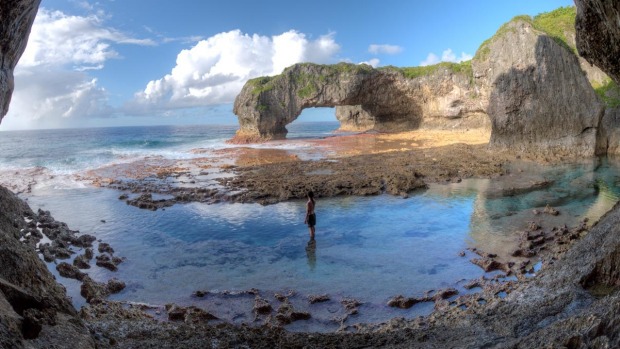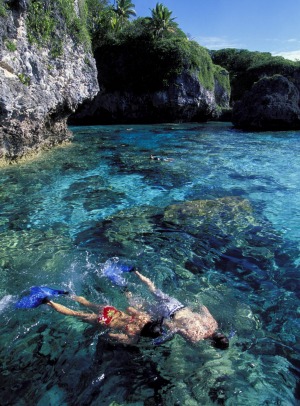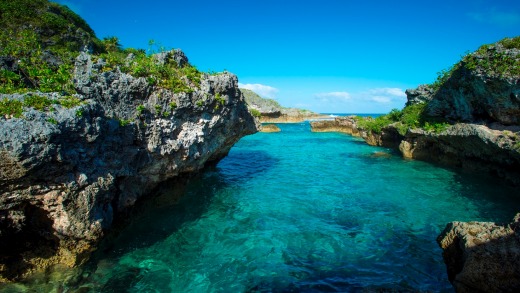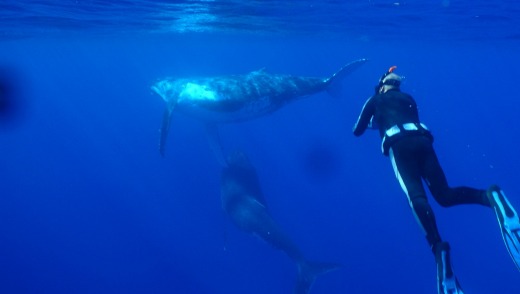
Discover this sleepy Pacific paradise before everyone else does.
In a silvery column of light, a sea snake is floating skywards. As it draws near me it pauses for a second in its arcing, S-bending ascent before joining the bubbles from my regulator, heading for the surface where it will drink in a gulp of air and corkscrew back to its sandy whorl on the ocean floor. It's a banded Niue sea krait, known here as a katuali, highly venomous but never known to bite. They're curious, given to approaching divers, and unafraid. Just a few minutes before, I watched Mitch, my divemaster, stroking one as it slithered between his bare hands. It's not alone. At any moment I can see at least two or three more snakes, an abundance that gives this dive site the name of Snake Gully.
Adrift in the Pacific Ocean, set roughly at the centre of a triangle formed by American Samoa, Tonga and the Cook Islands, Niue is the world's smallest independent nation, population around 1600. From the sea it looks like a cake, an uplifted coral island with a palisade of sea cliffs rearing up to 30 metres high along its 64-kilometre coastline. It has no natural harbours, and the reef that surrounds the island makes for dangerous sailing. The only anchorage is at Alofi, the capital.

Niue does not flaunt itself with vulgar displays. Apart from a couple of bikini-sized slips of sand in the south-west, there is nothing that any right-minded Australian would call a beach. The Matavai, the island's largest resort, is not going to set the world on fire. Much of the coastline is spiked with cruel blades of limestone waiting to puncture a calf if you mistime your step. Village houses are purposeful rather than pretty. There is nothing Mr Niue Homeowner likes more than a shipping container parked at the side of the house. What Niue does have though is personality, a big heart, and something I am tempted to call innocence.
The word "sleepy" does not plumb the depths of quietude that prevail on Niue. The island sees around 6000 visitors per year, about what Bali gets in an average day. Cycling the eight-kilometre road between Matavai and Alofi, I am passed by four cars, and that's the total for my outward and return journeys. Raising a finger in salute to other drivers is standard, although this minor pleasantry is suspended in Alofi, where one might pass three other cars while driving the main street of this bustling metropolis.
It's also quirky, in the way that castaway islands are when left to their own devices.

"Don't worry if you see a naked man coming out of the bush when you come past here," says Pino Vase, my guide on the Commodore's tour of the western side of the island. "That's Noah, he won't bother you." And I do, and he doesn't.
I'm having my morning espresso in Crazy Uga's, a casual dining miracle perched on the clifftop at Alofi, when the chief of police comes in, shakes my hand and wishes me well. The day before I'd spotted him with a friend, sitting in a van which trembled they were laughing so much.
Nothing much happens on Sundays. In the morning, men don suits and ties, women put on floaty white dresses trimmed with lace, necklaces and straw hats and set off to church, where they will sing with voices borrowed from angels and bounce small children on ample hips. Afterwards they gather in family groups to eat, laugh and sleep, but swimming and other forms of rowdy enjoyment are frowned upon.

At some stage during the day, every visitor will make their way to Avateli's Washaway Cafe for a burger, open Sundays only. An open-fronted shed overlooking the small bay where fishermen launch their outrigger canoes, the Washaway is run by Willie Santelli, a fisherman with a piratical bent and abundant charm. Hanging from the rafters is a collection of salt-stained T-shirts with hand-written accolades, flags, fishing floats and even a guitar. The bar works on an honesty system. Pour yourself a glass of wine or grab a beer from the fridge, write it down in the book and Willie's crew tot it up when you leave.
This is an island cut out for adventure. The diving is off the wall, literally. Two laps of an Olympic pool from the shore, the bottom falls away and you're in depths of more than 100 metres. Sightings of pelagic species are frequent, including hammerheads, tuna, barracuda, eagle rays and turtles, as well as the tropical species found in shallower water around the coral reef.
Another distinguishing feature of diving off Niue is its topography. The island is honeycombed with caves above and below the waterline, "like a Swiss cheese" according to Lance, another divemaster, creating a Gaudi-like playground of caves, spires, canyons and swim-throughs. The Chimney is a 23-metre shaft that starts just five metres below the surface and exits to a large cavern. Dive groups are typically small, just three and four on the days I dive with Buccaneer Adventures, and the visibility is exceptional. Most of the water that falls on the island percolates through the limestone cap into a freshwater reservoir that sits below Niue. Runoff is minimal, which makes for gin-clear seawater.
Between June and October, humpbacks are sighted daily around the island, many of them mothers with calves. While the deep water brings them close inshore, Buccaneer offers even closer encounters. On an afternoon of bright sunshine off Tepa Point, a whale displays its acrobatic prowess, breaching and tail slapping, but the three-metre swell makes it too difficult to approach, even within the 100 metre exclusion zone. In calmer waters north of Alofi we spot a mother and calf. They've dived by the time we put on masks and slip over the side, but they are stationary in the deep, milk-blue ghosts hovering 50 metres below us.
Along the island's west coast, a platform which can be anything from 10 to 50 metres wide extends from the base of the cliffs. At high tide this platform is lathered by waves, and dangerous, but for an hour or so either side of low tide it becomes a beachcomber's paradise, liberally furnished with corals and squirming with fishy life. Set into the platform are blue troughs the size of backyard pools, where you can snorkel with octopus and tropical fish for company.
One of the finest of the island's swimming holes is Limu Pools, where the sea has gouged a serpentine bay from the limestone, filled with coral and sand and protected from the waves by a natural rock breakwater.
Alongside its natural credentials, Niue attracts some surprising talents, and none more so than Avi Rubin, who left his native Israel at a tender age, set up a jewellery business in the United States, sold it for a small fortune and set off for the South Pacific to find his inner-Robinson Crusoe. He fetched up on Niue and became a commercial fisherman, supplying the local fish processing plant. When that venture went bust he decided to open a sushi restaurant together with Taiichi Fox, a Japanese entrepreneur who also operates another sushi joint in Svalbard, in Norway's Arctic. Among his many other ventures, Avi now operates Kaiika, a sushi restaurant on Alofi's main street. The combination of tuna and moonfish straight off Avi's fishing boat and a wizard Japanese sushi chef has proved a stellar success and Kaiika has been voted one of the best sushi restaurants outside Japan, by Japanese.
Tradition runs deep. While many Niueans have departed, mostly to New Zealand in search of education and jobs, there remains a core of devoted loyalists who love the island life. Polynesian culture is alive and well, with magic as one of its pillars. Any Niuean will think twice before driving south along the coast road out of Alofi at night, past the sea cave where the dead were once left.
One of the guardians of Niuean culture and traditional knowledge, Misa Kulatea is old, but he still takes visitors on three-hour walking tours of his garden opposite the high school above Alofi. It's not a long way but he can't walk more than five metres before stopping once again, putting down the wheelbarrow that is his toolbox and opening yet another window on his remarkable world. Misa grew up living in the bush, and living off it. He shows me a tiny limestone cave furnished with a mattress covered with coconut palm leaves, his house, and his childhood bed, nothing like the comfortable house that he now calls home.
It's not perfect. Crime happens, and there is a jail, located on the far side of the golf course. According to Hima Douglas, who takes me on a tour of the eastern island, the last two occupants were feuding neighbours who burned one another's houses down and copped a sentence, sharing a cell. One of the criminals could sometimes be seen out on the course of an evening with a couple of irons and a putter, playing a quiet nine holes.
New Zealanders have been keeping Niue under wraps, saving it for themselves. The twice weekly flights to the island – via Air New Zealand – depart Auckland in the early morning, requiring Aussies to make an overnight stop in Auckland. The Niue tourism office is located in New Zealand and all the promotional budget is spent there. Our trans-Tasman friends have been keeping it under the radar, out of sight. Not any longer though. The secret's out. It's game on.
The writer was a guest of Niue Tourism.
MORE INFORMATION
niueisland.com
GETTING THERE
Air New Zealand operates between Auckland and Niue, twice-weekly during the April-November peak season, once a week the rest of the year.
STAYING THERE
Matavai Resort is the biggest and best equipped of the island's accommodation. Seafront rooms in the new wing are spacious and comfortable. The island also has a number of small guesthouses and self-catering apartments, available on the Niue Island website .
SEE + DO
For all aquatic adventures, see the Buccaneer Adventures website . Vehicles and motorbikes are available for hire, and essential for exploring the island. A Niuean driver's licence is required, available from the police station for $NZ22.50. Anyone who wishes to dine at Kaiika should book as soon as possible after they arrive.